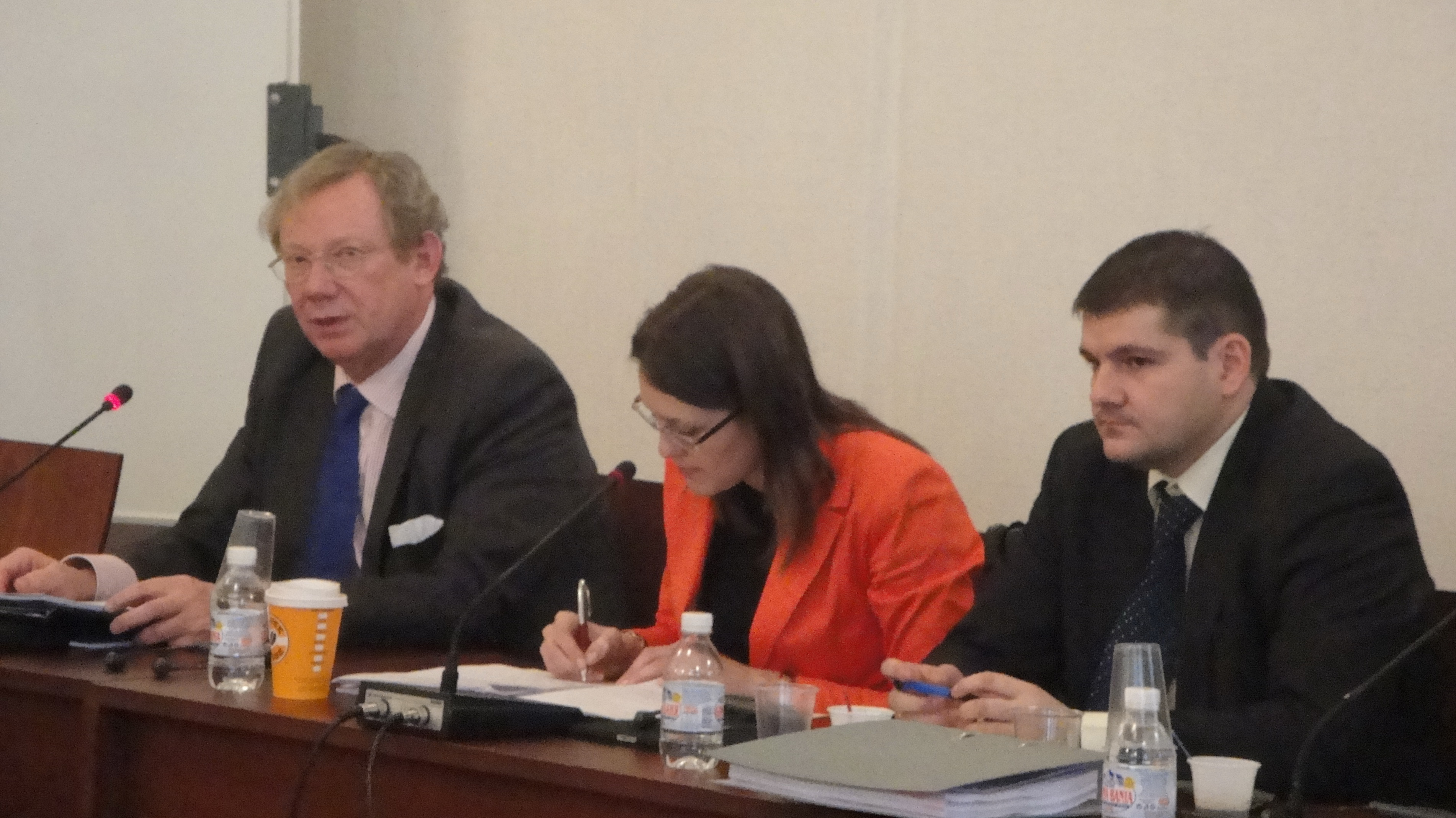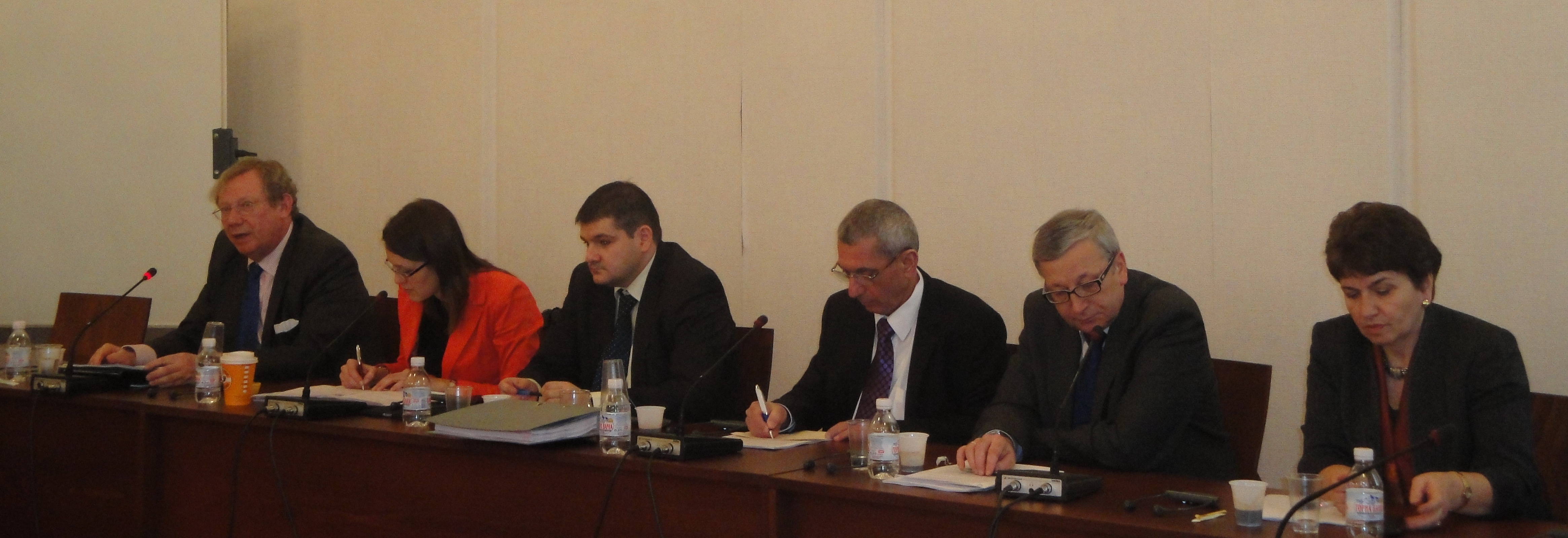National Assembly archive
The Danish EU Presidency Priorities: “a responsible, dynamic, green and safe Europe”
12/01/2012
The European Affairs and Oversight of the European Funds, and the Budget and Finance Committees held a joint meeting on January 12, 2012 to hear the presentations of the Ambassadors of the Member States representing the Troika – Poland, Denmark and Cyprus. The focus of the discussion was on the achievements of the Polish Presidency and the issues on the agenda for the Danish Presidency during the next six months. The discussion was well received by the Committees’ members due to the fact that such deliberations have become a tradition in the National Assembly.
H.E. the Ambassador of Poland, Mr. Leszek Hensеl, made a brief review of the achievements of Poland, the Member State that held the Presidency before Denmark, over the past six months. Ambassador Hensеl portrayed Polish Presidency as successful given the context of the economic crisis in which this presidency had to be run and steer. This complex situation dictated the top issues of the discussions, debates at the EU level. H.E. Hensеl noted that Poland has worked exclusively for growth, security and transparency in the EU. According to him, the three key priorities set by the Polish Presidency helped to accelerate the cohesion and deepening of integration process within the EU’s 27 Member States. H.E. Hensеl mentioned as Polish Presidency’s achievements the conclusion of the negotiations on a package of six legislative proposals for the new EU economic governance and the adoption of the Declaration of Krakow in September 2011, which contains key recommendations for removing barriers to the EU’s Internal Market. H.E. Hensеl outlined also the efforts of Poland in the negotiations for a European Patent. In the field of security and in particular the energy, H.E. Hensеl underlined the significant progress made in granting EC the mandate to negotiate gas supplies with Azerbaijan and Turkmenistan. Not least, the extension by two years of the Program Food Aid for the poorest EU citizens during the Polish Presidency is a remarkable achievement that falls within the priority “secure Europe” in the social area. As for the priority “Open Europe”, H.E. Hensеl referred to the signing of the Accession Treaty with Croatia at the European Council on December 9, 2011.
Following the well received presentation of the Polish Ambassador by the Committees’ members, the Ambassador of Denmark, Mr. Kore Janson, was given the floor. He presented and commented on the priority areas of the new rotating EU Presidency which will direct its efforts to achieve a responsible, dynamic, “green” and secure Europe. H.E. Mr. Janson pointed out that this is the seventh Danish Presidency in the EU, but the first since the adoption of the Lisbon Treaty. He assured Committees’ members that the Danish Presidency will continue to work in the areas initiated by the Polish Presidency, but it’s very likely that the Presidency will inevitably be marked by the economic crisis, as he defined it, the worst since World War Two. He said the biggest challenge in 2012 will remain the fight against the crisis. “If serious debt problems are not solved in some countries, Denmark and Bulgaria will suffer too” said the Ambassador.
According to H.E. Janson, generating economic growth is necessary and must inevitably appear on the agenda. H.E. Mr. Janson pointed out that Europeans wants Europe to remain a major power that the world has to reckon with. Therefore, revitalizing the Single Market Act with its 12 priority areas and a plan for economic growth is high on the agenda for the Danish Presidency. Particular attention according to H.E. Mr. Janson, must be given to sectors that will generate growth, such as promoting an integrated approach among the key EU policies, including areas such as agriculture, transport and cohesion. Undoubtedly, the focus must shift to “green energy” which the next MFF 2014-2020 must devote significant resources to it in order to achieve the goals of “Europe 2020” with specific attention to energy reduction by 20% by 2020.
In conclusion, the Danish ambassador pointed to the need to strengthen mechanisms of the Common Asylum System and the Schengen Area in Europe. In this context, H.E. Mr. Janson gave a clear signal from the Danish Presidency in support of an early accession of Bulgaria and Romania to the visa-free space.
MPs wished success to the new Danish EU Presidency. In the following discussion, they expressed their expectation that Denmark, which is in similar economic position with Bulgaria as both countries are not part of the eurozone, will serve as kind of a bridge between 17 and 10 (i.e. between euro area Member States and those who are not yet part of it) in the forthcoming negotiations on important economic and financial issues in the EU. In this way, the risks of forming “two-speed Europe” will be minimized, a position that is repeatedly defended by the Bulgarian parliament in the last year.
H.E. the Ambassador of Poland, Mr. Leszek Hensеl, made a brief review of the achievements of Poland, the Member State that held the Presidency before Denmark, over the past six months. Ambassador Hensеl portrayed Polish Presidency as successful given the context of the economic crisis in which this presidency had to be run and steer. This complex situation dictated the top issues of the discussions, debates at the EU level. H.E. Hensеl noted that Poland has worked exclusively for growth, security and transparency in the EU. According to him, the three key priorities set by the Polish Presidency helped to accelerate the cohesion and deepening of integration process within the EU’s 27 Member States. H.E. Hensеl mentioned as Polish Presidency’s achievements the conclusion of the negotiations on a package of six legislative proposals for the new EU economic governance and the adoption of the Declaration of Krakow in September 2011, which contains key recommendations for removing barriers to the EU’s Internal Market. H.E. Hensеl outlined also the efforts of Poland in the negotiations for a European Patent. In the field of security and in particular the energy, H.E. Hensеl underlined the significant progress made in granting EC the mandate to negotiate gas supplies with Azerbaijan and Turkmenistan. Not least, the extension by two years of the Program Food Aid for the poorest EU citizens during the Polish Presidency is a remarkable achievement that falls within the priority “secure Europe” in the social area. As for the priority “Open Europe”, H.E. Hensеl referred to the signing of the Accession Treaty with Croatia at the European Council on December 9, 2011.
Following the well received presentation of the Polish Ambassador by the Committees’ members, the Ambassador of Denmark, Mr. Kore Janson, was given the floor. He presented and commented on the priority areas of the new rotating EU Presidency which will direct its efforts to achieve a responsible, dynamic, “green” and secure Europe. H.E. Mr. Janson pointed out that this is the seventh Danish Presidency in the EU, but the first since the adoption of the Lisbon Treaty. He assured Committees’ members that the Danish Presidency will continue to work in the areas initiated by the Polish Presidency, but it’s very likely that the Presidency will inevitably be marked by the economic crisis, as he defined it, the worst since World War Two. He said the biggest challenge in 2012 will remain the fight against the crisis. “If serious debt problems are not solved in some countries, Denmark and Bulgaria will suffer too” said the Ambassador.
According to H.E. Janson, generating economic growth is necessary and must inevitably appear on the agenda. H.E. Mr. Janson pointed out that Europeans wants Europe to remain a major power that the world has to reckon with. Therefore, revitalizing the Single Market Act with its 12 priority areas and a plan for economic growth is high on the agenda for the Danish Presidency. Particular attention according to H.E. Mr. Janson, must be given to sectors that will generate growth, such as promoting an integrated approach among the key EU policies, including areas such as agriculture, transport and cohesion. Undoubtedly, the focus must shift to “green energy” which the next MFF 2014-2020 must devote significant resources to it in order to achieve the goals of “Europe 2020” with specific attention to energy reduction by 20% by 2020.
In conclusion, the Danish ambassador pointed to the need to strengthen mechanisms of the Common Asylum System and the Schengen Area in Europe. In this context, H.E. Mr. Janson gave a clear signal from the Danish Presidency in support of an early accession of Bulgaria and Romania to the visa-free space.
MPs wished success to the new Danish EU Presidency. In the following discussion, they expressed their expectation that Denmark, which is in similar economic position with Bulgaria as both countries are not part of the eurozone, will serve as kind of a bridge between 17 and 10 (i.e. between euro area Member States and those who are not yet part of it) in the forthcoming negotiations on important economic and financial issues in the EU. In this way, the risks of forming “two-speed Europe” will be minimized, a position that is repeatedly defended by the Bulgarian parliament in the last year.
 Български
Български English
English


